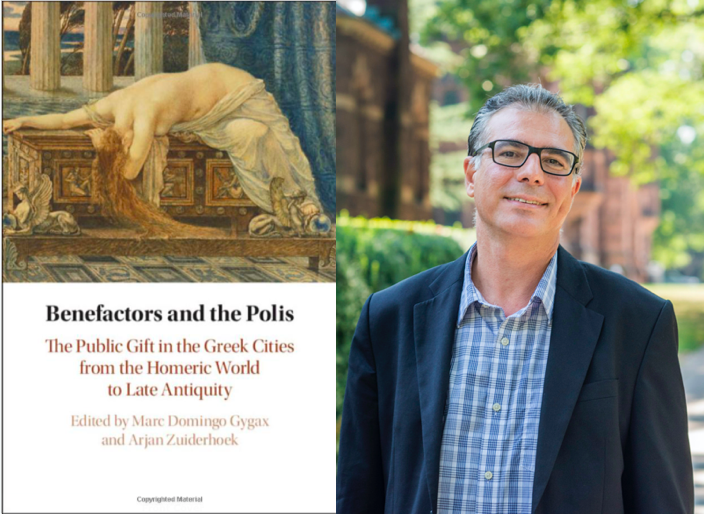Marc Domingo Gygax is Director of the Program in the Ancient World and Professor of Classics. His book “Benefactors and the Polis: The Public Gift in the Greek Cities from the Homeric World to Late Antiquity” was co-edited by Arjan Zuiderhoek (Universiteit Gent) and published by Cambridge University Press in December 2020.
How did you get the idea for this project?
The idea came from a conversation with Professor Peter Garnsey of Cambridge University. When Garnsey visited Princeton to give a lecture, he asked about my research on public gifts in ancient Greece and told me that Arjan Zuiderhoek at Ghent University was working on similar questions. Later, Garnsey put the two of us in touch, and we realized that our investigations were complementary: while I was studying the origins of the phenomenon—which specialists call ‘euergetism’—Zuiderhoek was focusing on its later manifestations in the Roman period. We therefore decided to combine forces to produce a volume that would offer the first survey of elite donations to Greek communities from the Homeric world to Late Antiquity.
How has your project developed or changed throughout the research and writing process?
Traditionally, the study of public gifts concentrated either on the donors and their motivations, or on one of the most visible and best-documented effects of such gifts, the honors the cities (or poleis, to use the ancient term) granted benefactors. But the workshop in Princeton on which this volume is based showed that the study of public giving has changed considerably in recent years, and that scholars have become increasingly interested in the relational aspects of the phenomenon, meaning the exchange of gifts for official and unofficial rewards. It soon became clear that this was not going to be a book about public gifts in general, but about public gifts as part of a relationship of reciprocity, something that was not obvious when we launched the project. This does not mean that our contributors have renounced addressing other aspects of public gifts, such as the aims of benefactors, the extent of their generosity, or the social, political and financial consequences of their actions. But they have treated these aspects as better understood in light of the exchange between donors and communities and the related conditions: negotiations between the parties, social pressure, public discourses, and a capacity for self-deception (what Pierre Bourdieu would call “common miscognition”). In fact, the term “public gift” in the volume’s subtitle refers not only to the gifts made by benefactors—as most people will assume when they see the cover—but also to the honors with which cities compensated donors or triggered their donations in advance.
What questions for future investigation has the project sparked?
While this is a book about public generosity, we hope it will add to one of the main debates among ancient historians over the last three decades, about whether the polis experienced a political and economic “decline” in the Hellenistic and Roman periods. How is that debate affected, for instance, by the thesis put forward in some chapters, that public donations served to compensate the masses for the superior position of elites from the archaic period to the Roman Empire? or by the argument that 5th– and 4th-century BCE Athens tried to avoid both public gifts from economic and political elites and honors for citizens, even if it eventually came to accept both, largely due to economic reasons, and that it prioritized compulsory services and taxes over voluntary contributions? At a fundamental level, the debate about elite public munificence in ancient Greek society is a discussion of the relationship of the wealthy and powerful to the community as a whole (a theme as relevant in our own time as it was in antiquity), and about the evolution of this relationship throughout the long and varied history of the polis. This is an important subject in and of itself, but we suggest that it is also one with wide ramifications for other elements of ancient Greek history. We thus hope that the arguments presented in our volume will not only inspire further work on public liberality in the polis, while also offering new insights into some of the broader debates about polis history, within which specific views of elite public gifts have often played a crucial role.
Why should people read this book?
History is by definition the academic discipline that systematically traces social change, and readers normally expect books on the subject to inform them about specific developments and events. But the historical process is also a result of how changes interact with continuities, and continuities are in fact often more interesting, because they are less visible. Greek public gift-giving is a good case study of that dynamic, and we hope our book will allow readers to learn about the importance of continuities and the benefits of the longue durée approach to the study of history. In addition, we aim to make specialists in Greek history more aware of the fact that elite public giving was a structural feature of polis-society from Homeric times until the Byzantine period, something that has not been as obvious as it might have been in academic discussion of the topic to date.
Learn more about other publications by Princeton University faculty in the humanities by exploring our Faculty Bookshelf.
















